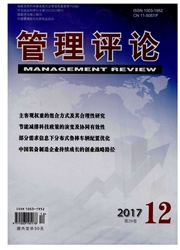

 中文摘要:
中文摘要:
在供应链低碳化背景下,研究了具有公平偏好的制造商向零售商提供两部定价契约的供应链协调问题。分别讨论了零售商是否具有公平偏好的情况,通过模型求解得到实现供应链协调的契约参数及利润分配方案。研究发现,当仅有制造商具有公平偏好时,两部定价契约可以实现供应链协调;当制造商和零售商均具有公平偏好时,在竞争型渠道中,特定参数制约下两部定价契约不能够协调供应链,而在和谐型渠道中仍能协调供应链,制造商占有的渠道利润随零售商公平偏好的程度而不同。
 英文摘要:
英文摘要:
In the context of low-carbonization supply chain, this paper examines the supply chain coordination problem based on a manu- facturer with fairness preference provides the two-part tariff contract to a retailer. Whether the retailer has the fairness preference will be discussed separately. Through the model we get contract parameters to coordinate the supply chain and profit distribution. The conclusions show that when only the manufacturer has fairness preference, the two-part tariff can still coordinate supply chain ; when both the manu- facturer and the retailer have preference, in acrimonious channel under constraints of certain parameters, the two-part tariff contract can- not coordinate supply chain while under other conditions it can coordinate supply chain. The manufacturer will occupy different level of channel profits, depending on the degree of the retailer' s fairness preference.
 同期刊论文项目
同期刊论文项目
 同项目期刊论文
同项目期刊论文
 期刊信息
期刊信息
